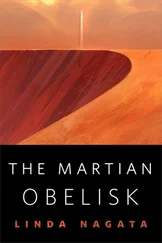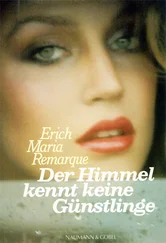“Then I have a job as hat-check girl in the Red Mill.”
“Have you really?”
“God, you are stupid!” Lisa replies.
“And the clothes and jewelry?”
“All cheap imitations.” Lisa grins. “Every husband believes that! You can persuade men of anything! Well then, take your green groceries. Send them to some calf. You look as though you sent flowers.”
“Never.”
Lisa throws me an abysmal glance over her shoulder. Then without replying she walks back across the street on her beautiful legs. She is wearing shabby red slippers; one has a pompom, on the other it is missing.
The roses gleam in the twilight It is an impressive bouquet. Nothing shabby about Riesenfeld. Fifty thousand marks, I estimate. Glancing around cautiously, I pick them up like a thief and go to my room.
Upstairs the window is red with sunset. The room is full of shadows and reflections; suddenly loneliness falls upon me as though from ambush. I know it’s nonsense; I am no more lonely than an ox in a herd of oxen, but I cannot help myself. Loneliness has nothing to do with a lack of company. It occurs to me that perhaps I was too hasty with Erna last night. Quite possibly there could be an innocent explanation for everything that has happened. She was jealous; that was clear in everything she said. And jealousy is love. Everyone knows that.
I stare through the window, realizing that jealousy is not love but possessiveness—but what does it matter? The twilight distorts your thoughts, and you ought not to argue with women, Georg says. But that’s exactly what I have been doing! Full of remorse I smell the fragrance of the roses, which have transformed my room into a Venusberg. I realize that I am melting into universal forgiveness, universal conciliation and hope. Quickly I write a few lines, seal the envelope without even rereading them, and go into the office to get the issue paper in which the last shipment of porcelain angels was sent. I wrap up the roses and go to look for Fritz Kroll, the youngest sprig of the firm. Fritz is twelve years old. “Fritz,” I say, “do you want to earn two thousand?”
“You bet,” Fritz replies. “Same address?”
“Yes.”
He disappears with the roses—the third clearheaded person this evening. They all know what they want, Kurt, Lisa, Fritz—I alone have no idea. It’s not Erna either; I realize that the minute it’s too late to call Fritz back. But what is it? Where are the altars, where the gods and where the sacrifices? I decide to go to the Mozart concert—even though I shall be alone and the music will make it still worse.
The sky is full of stars when I come back. My steps reverberate in the street and I am full of excitement. Quickly I open the office door, turn on the light, and stop short. There are the roses beside the Presto mimeographing machine and there, too, is my letter, unopened, and beside it a scarp of paper with a message from Fritz. “The lady says to go bury yourself. Sincerely Fritz.”
Bury myself! A thoughtful joke! There I stand, disgraced to the marrow, full of shame and rage. I put Fritz’s note into the cold grate. Then I sit down in my chair and brood. My rage outweighs my shame, as always happens when one is really ashamed and knows he ought to be. I write another letter, pick up the roses, and go to the Red Mill. “Please give these to Fräulein Gerda Schneider,” I say to the doorman. “The acrobat.”
The man in the braided uniform looks at me as though I had made him an immoral proposal. Then he gestures haughtily over his shoulder with his thumb. “Give them to a page.”
I find a page and tell him to present the bouquet during the performance.
He promises to do so. I hope Erna will be there to see it. Then I wander for a while through the city until I grow tired and go home.
I am greeted by a melodious tinkle. Knopf is once more standing in front of the obelisk relieving himself. I say nothing; I want no more arguments. I take a pail, fill it with water, and empty it at Knopf’s feet. The Sergeant Major gapes, “Inundation,” he mutters. “Had no idea it had rained.” And he staggers into the house.
Over the woods hangs a dusky, red moon. The evening is sultry and very still. The glass man walks past silently. Now he can venture out; there is no danger that the sun will turn his head into a burning glass. However, he is wearing heavy rubbers as a precaution—there might be a thunderstorm and that is even more dangerous for him than the sun. Isabelle is sitting beside me on one of the garden benches in front of the pavilion for incurables. She is wearing a tight black dress and there are high-heeled golden shoes on her bare feet.
“Rudolf,” she says, “you abandoned me again. Last time you promised to stay. Where have you been?”
Rudolf, I think, thank God! I couldn’t have stood being Rolf tonight. I have had a depressing day and feel as though I had been shot at with rock salt.
“I have not abandoned you,” I say. “I was away—but I have not abandoned you.”
“Where were you?”
“Somewhere out there—”
Out there with the madmen is what I almost said, but I caught myself in time.
“Why?”
“I don’t know, Isabelle. People do so many things without knowing why—”
“I was looking for you last night. There was a moon—not that one up there, the red, restless, lying one—no, the other moon, the cool, clear one that you can drink.”
“It would certainly have been better for me to be here,” I say, leaning back and feeling peace flood into me from her. “How can you drink the moon, Isabelle?”
“In water. It’s perfectly easy. It tastes like opal. You don’t really feel it in your mouth; that comes later on—then you feel it beginning to shimmer inside you. It shines out of your eyes. But you mustn’t turn on a light. It wilts in the light.”
I take her hand and lay it against my temple. It is dry and cool. “How do you drink it in water?” I ask.
Isabelle withdraws her hand. “You hold a glass of water out the window—like this.” She stretches out her arm. “Then the moon is in it. You can see it, the glass lights up.”
“You mean it’s reflected in it?”
“It is not reflected. It is in it.” She looks at me. “Reflected—what do you mean by reflected?”
“A reflection is an image in a mirror. You can see your reflection in all sorts of things that are smooth. In water too. But you are not in it.”
“Things that are smooth!” Isabelle smiles, politely incredulous. “Really? Just imagine!”
“But of course. If you stand in front of a mirror you see yourself in it too.”
Isabelle takes off one of her shoes and looks at her foot. It is narrow and long and unmarred by calluses. “Well, perhaps,” she says, still politely uninterested.
“Not perhaps. Certainly. But what you see isn’t you. It is only a mirror image. Not you.”
“No, not me. But where am I when it is there?”
“You’re standing in front of it. Otherwise you couldn’t see your reflection.”
Isabelle puts her shoe on again and glances up. “Are you sure of that, Rudolf?”
“Perfectly sure.”
“I’m not. What do the mirrors do when they’re alone?”
“They reflect whatever is there.”
“And if nothing is there?”
“That’s impossible. Something is always there.”
“And at night? In the dark of the moon—when it’s perfectly black, what do they reflect then?”
“The darkness,” I say, no longer completely sure of my ground, for how can there be a reflection in complete darkness? It always requires some light.
“Then they are dead when it is completely dark?”
“Perhaps they are asleep—and when the light comes again they wake up.”
Читать дальше








